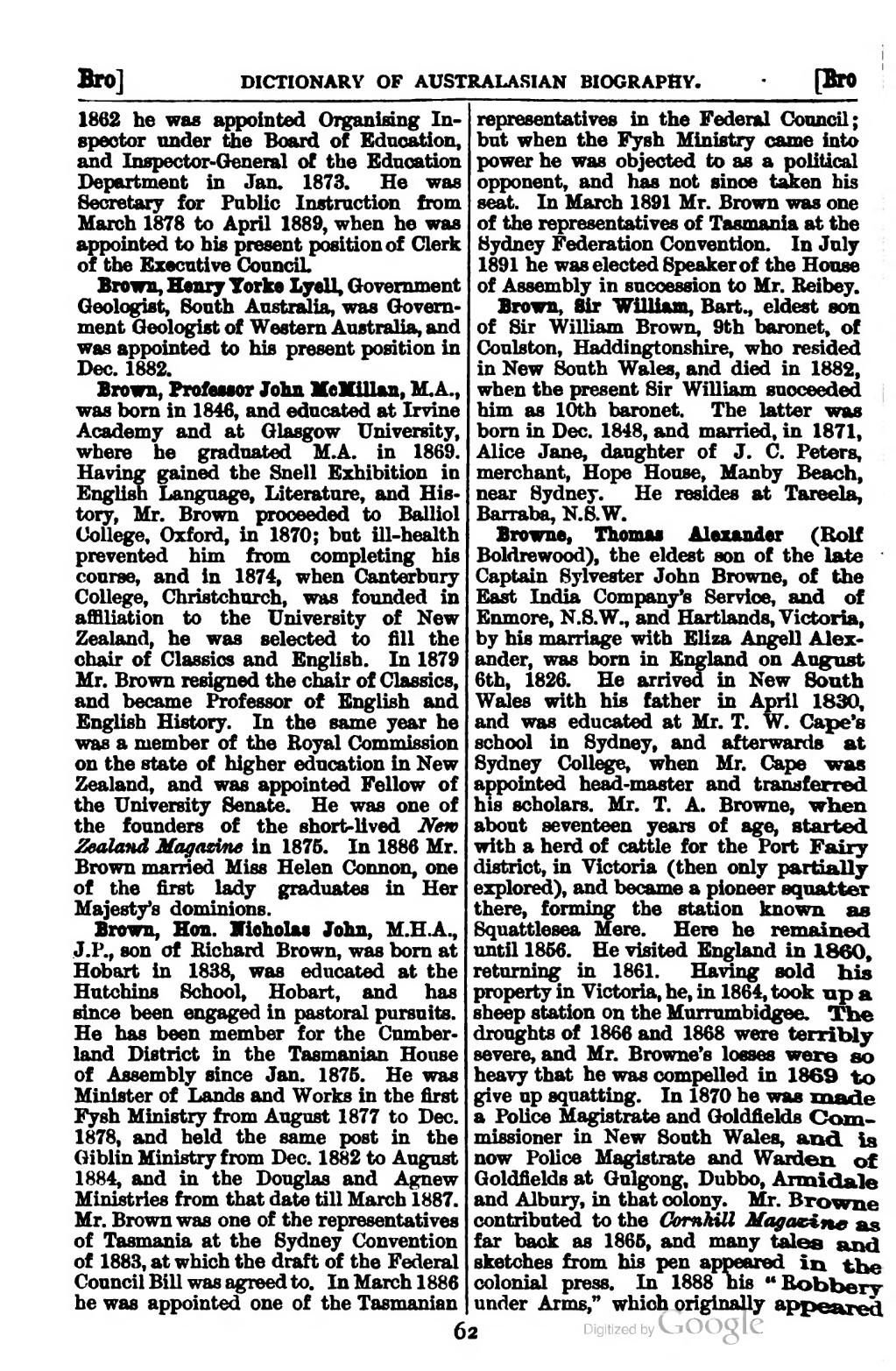1862 he was appointed Organising Inspector under the Board of Education, and Inspector-General of the Education Department in Jan. 1873. He was Secretary for Public Instruction from March 1878 to April 1889, when he was appointed to his present position of Clerk of the Executive Council.
Brown, Henry Yorke Lyell, Government Geologist, South Australia, was Government Geologist of Western Australia, and was appointed to his present position in Dec. 1882.
Brown, Professor John McMillan, M.A., was born in 1846, and educated at Irvine Academy and at Glasgow University, where he graduated M.A. in 1869. Having gained the Snell Exhibition in English Language, Literature, and History, Mr. Brown proceeded to Balliol College, Oxford, in 1870; but ill-health prevented him from completing his course, and in 1874, when Canterbury College, Christchurch, was founded in affiliation to the University of New Zealand, he was selected to fill the chair of Classics and English. In 1879 Mr. Brown resigned the chair of Classics, and became Professor of English and English History. In the same year he was a member of the Royal Commission on the state of higher education in New Zealand, and was appointed Fellow of the University Senate. He was one of the founders of the short-lived New Zealand Magazine in 1875. In 1886 Mr. Brown married Miss Helen Connon, one of the first lady graduates in Her Majesty's dominions.
Brown, Hon. Nicholas John, M.H.A., J.P., son of Richard Brown, was born at Hobart in 1838, was educated at the Hutchins School, Hobart, and has since been engaged in pastoral pursuits. He has been member for the Cumberland District in the Tasmanian House of Assembly since Jan. 1875. He was Minister of Lands and Works in the first Fysh Ministry from August 1877 to Dec. 1878, and held the same post in the Giblin Ministry from Dec. 1882 to August 1884, and in the Douglas and Agnew Ministries from that date till March 1887. Mr. Brown was one of the representatives of Tasmania at the Sydney Convention of 1883, at which the draft of the Federal Council Bill was agreed to. In March 1886 he was appointed one of the Tasmanian representatives in the Federal Council; but when the Fysh Ministry came into power he was objected to as a political opponent, and has not since taken his seat. In March 1891 Mr. Brown was one of the representatives of Tasmania at the Sydney Federation Convention. In July 1891 he was elected Speaker of the House of Assembly in succession to Mr. Reibey.
Brown, Sir William, Bart., eldest son of Sir William Brown, 9th baronet, of Coulston, Haddingtonshire, who resided in New South Wales, and died in 1882, when the present Sir William succeeded him as 10th baronet. The latter was born in Dec. 1848, and married, in 1871, Alice Jane, daughter of J. C. Peters, merchant, Hope House, Manby Beach, near Sydney. He resides at Tareela, Barraba, N.S.W.
Browne, Thomas Alexander (Rolf Boldrewood), the eldest son of the late Captain Sylvester John Browne, of the East India Company's Service, and of Enmore, N.S.W., and Hartlands, Victoria, by his marriage with Eliza Angell Alexander, was born in England on August 6th, 1826. He arrived in New South Wales with his father in April 1830, and was educated at Mr. T. W. Cape's school in Sydney, and afterwards at Sydney College, when Mr. Cape was appointed head-master and transferred his scholars. Mr. T. A. Browne, when about seventeen years of age, started with a herd of cattle for the Port Fairy district, in Victoria (then only partially explored), and became a pioneer squatter there, forming the station known as Squattlesea Mere. Here he remained until 1856. He visited England in 1860, returning in 1861. Having sold his property in Victoria, he, in 1864, took up a sheep station on the Murrumbidgee. The droughts of 1866 and 1868 were terribly severe, and Mr. Browne's losses were so heavy that he was compelled in 1869 to give up squatting. In 1870 he was made a Police Magistrate and Goldfields Commissioner in New South Wales, and is now Police Magistrate and Warden of Goldfields at Gulgong, Dubbo, Armidale and Albury, in that colony. Mr. Browne contributed to the Cornhill Magazine as far back as 1865, and many tales and sketches from his pen appeared in the colonial press. In 1888 his "Robbery under Arms," which originally appeared
62
